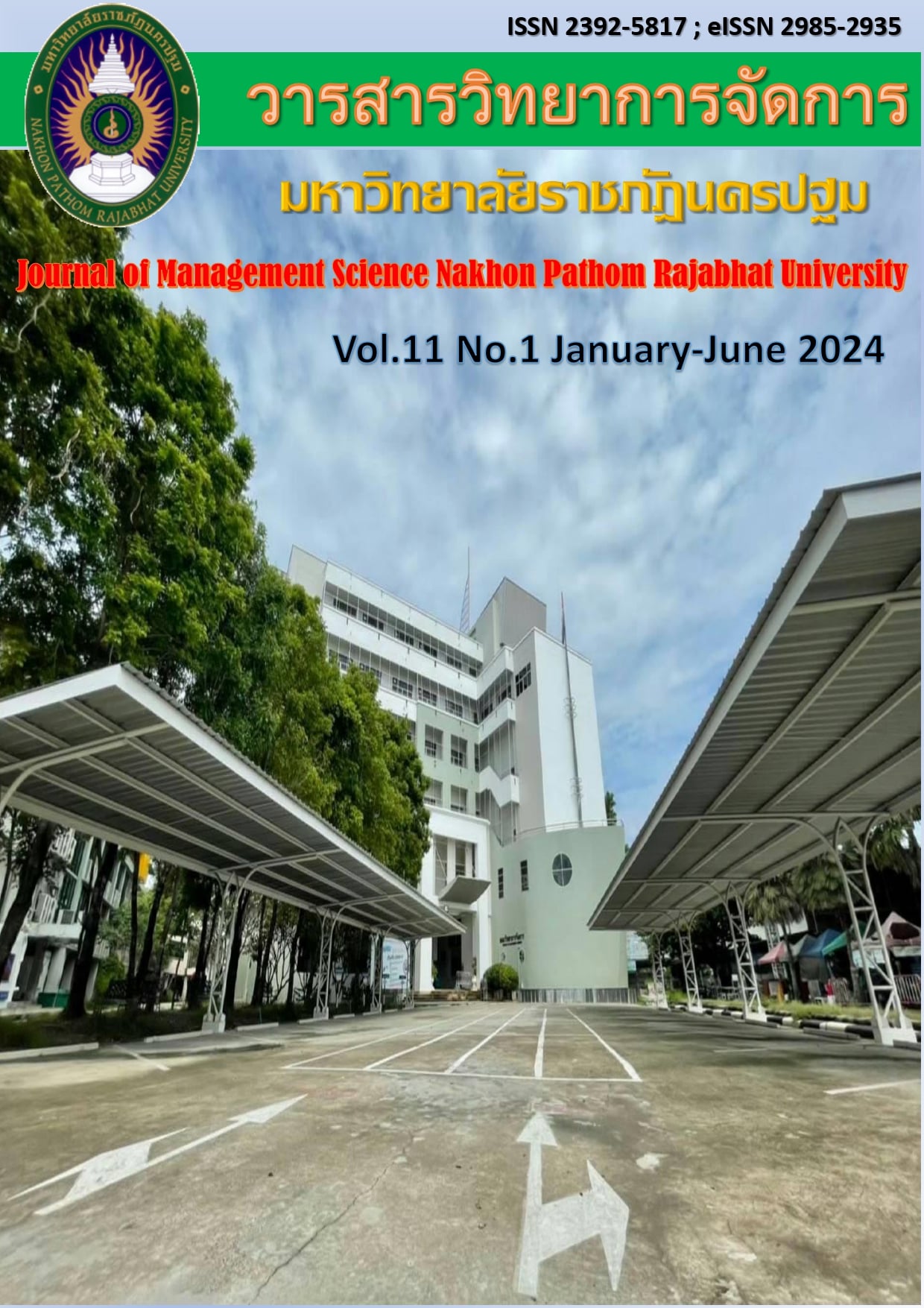The influence of knowledge management on the preventive behavior against COVID-19 risk among students of Western University, Kanchanaburi
Main Article Content
Abstract
The results of the research revealed that
1) When comparing the preventive behaviors against COVID-19 risk among students at Western University, Kanchanaburi, statistically significant differences were observed in all aspects. The top three differences in preventive behaviors before and after the study were: maintaining a distance of about 1-2 meters when conversing with others, avoiding the consumption of raw or undercooked food, and wearing face masks when leaving home, in that order.
2) The influence of knowledge management on the prevention and control of COVID-19 among students was evidenced by knowledge utilization (b=0.40) and knowledge creation (b=0.23). Factors that had an effect, but not to a statistically significant degree, included knowledge acquisition, knowledge sharing, and knowledge storing. The predictive power of the equation was 56.30%, and it could be written as follows:
Ytot =0.31+011X1+0.23X2**+0.14X3+0.40X4**+0.05X5
Article history: Received 21 December 2023
Revised 15 January 2024
Accepted 17 January 2024
SIMILARITY INDEX = 15.00 %
Article Details

This work is licensed under a Creative Commons Attribution-NonCommercial-NoDerivatives 4.0 International License.
The views and opinions of the article appearing in this journal are those of the author. It is not considered a view and responsibility of the editorial staff.
References
กรมควบคุมโรค กระทรวงสาธารณสุข. (2563ก). โรคติดเชื้อไวรัสโคโรนา 2019: Coronavirus Disease 2019 (COVID-19). นนทบุรี: กระทรวงสาธารณสุข.
กรมควบคุมโรค กระทรวงสาธารณสุข. (2563ข). แนวทางการทำความสะอาดฆ่าเชื้อในสถานที่ที่ไม่ใช่สถานพยาบาล โรคติดเชื้อไวรัสโคโรนา 2019 [อินเทอร์เน็ต). นนทบุรี: กระทรวงสาธารณสุข
ชัชวาลย์ วงษ์ประเสริฐ. (2548). การจัดการความรู้ในองค์การธุรกิจ. กรุงเทพฯ: เอ็กซเปอร์เน็ต.
ทิพย์รัตน์ อติวัฒนชัย. (2550).การจัดการความรู้ในวิทยาลัยบัณฑิตศึกษาการจัดการมหาวิทยาลัยขอนแก่น. ศึกษาศาสตรมหาบัณฑิต สาขาวิชาการบริหารการศึกษา มหาวิทยาลัยขอนแก่น.
ธีระ รุญเจริญ. (2550). ความเป็นมืออาชีพในการจัดและบริหารการศึกษายุคปฏิรูปการศึกษา. กรุงเทพฯ: ข้าวฟ่าง.
บุญดี บุญญากิจ นงลักษณ์ ประสพสุขโชคชัย ดิสพงศ์ พรชนกนาถ และ ปรียวรรณ กรรณล้วน. (2549). การจัดการความรู้ จากทฤษฎีสู่การปฏิบัติ. กรุงเทพฯ: จิรวัฒน์ เอ็กเพรส.
บัญชา เกิดมณี สุรชัย ธรรมทวีธิกุล ญานพินิจ วชิรสุรงค์ บดินทร์ชาติ สุขบท และ สมบัติ ฑีฆทรัพย์. (2563). แนวคิดและทิศทางการแก้ปัญหาโควิด-19. วารสารก้าวทันโลกวิทยาศาสตร์, 20(1), 1-12.
ประกาย จิโรจน์กุล. (2556). แนวคิด ทฤษฎีการสร้างเสริมสุขภาพและการนำมาใช้. นนทบุรี : โครงการสวัสดิการ สถาบันพระบรมราชชนก.
ปัณณทัต ตันธนปัญญากร ทัศนพรรณ เวชศาสตร์ นลพรรณ ขันติกุลานนท์ และศศิวิมล จันทร์มาลี. (2565). ผลของโปรแกรมการเสริมสร้างการรับรู้เกี่ยววัคซีนป้องกันโรคโควิค-19 ของนักศึกษาสายวิทยาศาสตร์สุขภาพที่อยู่ในพื้นที่เสี่ยงต่อสถานการณ์การระบาด. วารสารวิจัยและพัฒนา วไลย
อลงกรณ์ ในพระบรมราชูปถัมภ์ สาขาวิทยาศาสตร์และเทคโนโลยี. 17(2).73-87.
พรพรรณ ประจักษ์เนตร และ กิรติ คเชนทวา. (2565). การจัดการตนเองของบุคคลที่เป็นโรคไม่ติดต่อเรื่องรังในช่วงโควิด-19 และบทบาทของการรู้เท่าทันสื่อสุขภาพแบบออนไลน์ การรับรู้ความสามารถตนเอง การสนับสนุนจากสังคม การรับรู้ความเสี่ยง และพฤติกรรมการค้นหาข้อมูลข่าวสาร. วารสาร
พัฒนบริหารศาสตร์. 62(2).1-35.
สมบัติ สุมาวลี. (2540). ประเทศไทยในทศวรรษหน้า: วิทัศน์นิด้า การสร้างองค์การแห่งการเรียนรู้แนวทางการพัฒนาทรัพยากรมนุษย์ในองค์การเพื่อการพัฒนาประเทศไทยใน ทศวรรษหน้า. กรุงเทพฯ: สถาบันบัณฑิตพัฒนาบริหารศาสตร์.
สำนักงานเขตพื้นที่การศึกษาประถมศึกษากาญจนบุรี เขต 2. (2564). ข้อมูลสารสนเทศด้านการศึกษาจังหวัดกาญจนบุรี ปีการศึกษา 2564 [ออนไลน์] ค้นเมื่อ 22 กรกฏาคม 2566 จาก https://www.kan2.go.th/wp-content/uploads/2022/05/ข้อมูลสารสนเทศด้านการศึกษาจังหวัดกาญจนบุรี.pdf
สุรชัย โชคครรชิตไชย. (2563). การระบาดของไวรัสโคโรนา (โควิด-19) ในประเทศไทย. วารสารสมาคมเวชศาสตร์ป้องกันแห่งประเทศไทย, 10(1).ฎ
อัญญาณี คล้ายสุบรรณ์. (2550). การจัดการความรู้ ฉบับปฐมบท. นครปฐม: เพชรเกษม.
Alavi, M. and Leidner, D. E. (2002). Knowledge management system: Issues, challenge and benefits. [Online]. Retrieved October 30, 2022 from http:// Delivery.acm.org/
1145/380000/374117/a1-alavi.pdf?key=374117&Key2=1864439621&coll=CUIDE&dl
=GUIDE&CFID=83146928&CFTOKEN=1645788.
Awad, E. M., and Ghaziri, H. M. (2004). Knowledge management. New Jersey: Pearson Education.
Bertels, R. (2004). Targeting Your Message is the Key to Successful Bank Marketing. Michigan Banker, 48 (1), 18-29.
Borghoff, U. M., & Pareschi, R. (1998). Information Technology for Knowledge Management. [Online]. Retrieved December 19, 2022 from: http://www.iicm.edus.
Debowski, S. (2006). Knowledge management. Singapore: Seng Lee Press Pte.
Dong, E., Du, H., & Gardner, L. (2020). An interactive web-based dashboard to track COVID-19 in real time. The Lancet Infectious Diseases, 20(5), 533–534.
Harkness, A., Behar-Zusman, V., & Safren, S. A. (2020). Understanding the impact of COVID 19 on Latino sexual minority men in a US HIV hot spot. AIDS and Behavior, 24(7), 2017–2023.
Huang, Y., & Zhao, N. (2020). Generalized Anxiety Disorder, Depressive Symptoms and Sleep Quality during COVID-19 Outbreak in China: A Web Based Cross-Sectional Survey. Psychiatry Research, 288. 112954.
Hussein, E., Daoud, S., Alrabaiah, H., & Badawi, R. (2020). Exploring Undergraduate Students’ Attitudes towards Emergency Online Learning during COVID-19: A Case from the UAE. Children and Youth Services Review, 119. 105699.
Malhotra, Y. (2003, September). Is Knowledge the Ultimate Competitive Advantage?. Business Management Asia. 16(2), 1-5.
McCalman, J., & Paton, A. R. (2000). Change Management: A Guide to Effective Implementation. London: Paul Chapman.
Probst, G., Raub, S and Romhardt, K. (2000). Knowledge Management in Higher Education. Bangkok: Office of the Secretariat, ASAHL_THAILAND.
Turban, E., & Aronson, J. E. (2001). Decision Support Systems and Intelligent Systems. Upper Saddle River, NJ: Prentice Hall.
Zhong BL, Luo W, Li HM, Zhang QQ, Liu XG, Li WT, Li Y. (2020). Knowledge, attitudes, and practices towards COVID-19 among Chinese residents during the rapid rise period of the COVID-19 outbreak: a quick online cross-sectional survey. Int J Biol Sci, 16(10), 1745-52.

